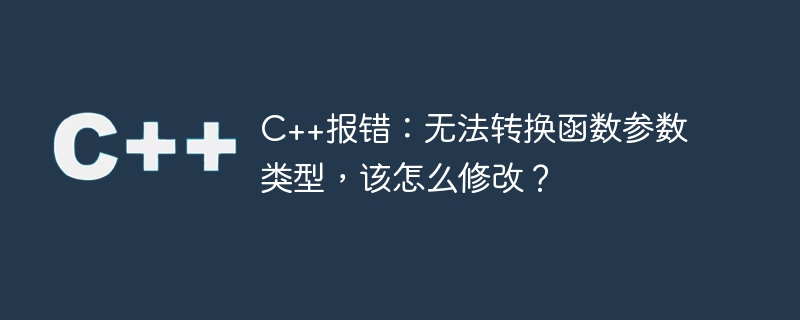

When programming in C, we often encounter various errors. One of the most common errors is the inability to convert function parameter types. This problem seems relatively simple, but it often causes headaches. Next, we will introduce how to solve this problem.
First, let’s look at a sample code:
#includeusing namespace std; void printNum(int num) { cout << "The number is: " << num << endl; } int main() { double num = 3.14; printNum(num); return 0; }
The code defines aprintNumfunction to output an integer. In the main function, we define a double-precision floating point numbernumand then pass it as a parameter to theprintNumfunction. There seems to be no problem with the logic of this code, but the following error message will be prompted:
error: cannot convert 'double' to 'int' for argument '1' to 'void printNum(int)' printNum(num); ^~~
The error message states: Typedoublecannot be converted to typeint, and FunctionprintNumaccepts a parameter of typeint. This is because when we call functionprintNum, the parameter type passed to it is inconsistent with the parameter type in the function declaration.
To solve this problem, the easiest way is to modify the parameter type of the calling function to ensure that the parameter type passed to the function is consistent with the parameter type in the function declaration:
#includeusing namespace std; void printNum(int num) { cout << "The number is: " << num << endl; } int main() { double num = 3.14; int intNum = static_cast (num); printNum(intNum); return 0; }
In the above code , we added astatic_castforced type conversion to convert the double-precision floating point numbernuminto an integerintNum, and thenintNumis passed to the functionprintNumas a parameter, thereby avoiding errors of inconsistent parameter types.
Of course, there are other ways to solve this problem, such as changing the parameter type todoublewhen declaring the function, or changing the function parameter type to a template type, etc. But no matter which method is used, we need to always pay attention to the matching of variable and function parameter types in C programming to avoid various errors due to type mismatch.
In short, to solve the problem of being unable to convert function parameter types, you need to pay attention to the setting of the parameter type in the function declaration, and whether the type of the parameter passed when calling the function meets the requirements of the function parameter type. As long as we keep these in mind, we can avoid the trouble caused by this error and successfully write high-quality C programs.
The above is the detailed content of C++ error: Unable to convert function parameter type, how to modify it?. For more information, please follow other related articles on the PHP Chinese website!
 Why can swoole be resident in memory?
Why can swoole be resident in memory? What is collaborative office
What is collaborative office Reasons why mobile phone touch screen fails
Reasons why mobile phone touch screen fails How to install linux system
How to install linux system What to do if there is no cursor when clicking on the input box
What to do if there is no cursor when clicking on the input box What are the access modifiers for classes in php
What are the access modifiers for classes in php Introduction to output devices in computers
Introduction to output devices in computers How to return to the homepage from an html subpage
How to return to the homepage from an html subpage



